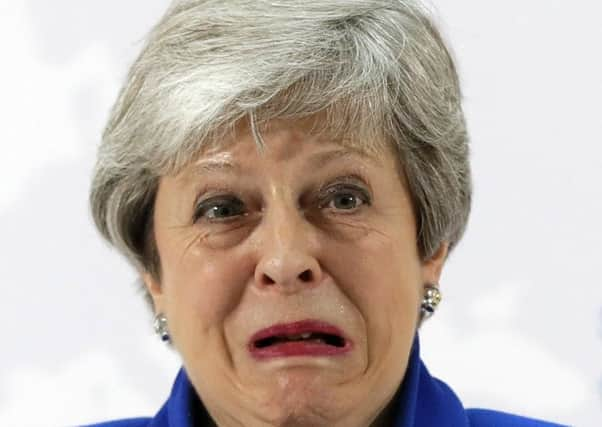Insight: Fill in the blanks of Theresa May’s dire legacy for Britain


When Private Eye published its Theresa May Memorial Issue (headline – The Prime Minister’s Legacy in Full – followed by a blank page) it raised a chortle or two. But it wasn’t long before critics started pointing out that the normally merciless magazine had been too generous. If only the legacy of May’s premiership was a big fat zero as opposed to a country more economically and politically divided than ever before.
Soon, the cover had been doctored to include a list of the many disasters she had presided over: a rise in rough sleeping and the use of food banks, Grenfell Tower fire families still not rehoused, the Windrush deportations, an increase in child poverty and, of course, the “Brexit clusterbourach”.
Advertisement
Hide AdAdvertisement
Hide AdAs she prepares to leave office, May has embarked on a last-ditch attempt to salvage her reputation; to transform herself from Cruella de Vil to Mary Poppins by throwing sweeteners at an electorate that has been forced to swallow the medicine of austerity policies since 2010.


Turning a deaf ear to the protests of Chancellor Philip Hammond, she is pushing for a £2bn public sector pay rise, billions in extra funding for schools and the restoration of maintenance grants, while enshrining in law a commitment to reach net zero carbon emissions by 2050.
More cynically, the woman who gave us the dog-whistle phrase “citizen of nowhere” sought to present herself as the last bastion against the forces of political populism rather than the open gate through which they charged.
In her valedictory speech at Chatham House, she spouted Cassandra-like prophecies about a dangerous new politics that “eschews compromise” and believes that “if you assert your view loudly enough and for long enough you will get your way in the end.”
Intended as digs at Boris Johnson and Donald Trump respectively, this self-serving revisionism merely served to underline her own worst qualities: her lack of courage (even with nothing left to lose, she failed to name her targets) and her inability to examine her own conscience.


The criticism of Johnson was supposed to suggest: “You’ll miss me when you see what’s coming next.” And that may be true. But it skirted over the crucial role the former home secretary played in normalising toxic right-wing rhetoric and in creating the conditions that allowed her nemesis to flourish.
Ditto her belated sub-trashing of Trump. Her description of politicians who take a zero-sum view of a world where “power unconstrained by rules is the only currency” is spot-on, yet embarrassing from a leader so desperate for a US trade deal she spent much of her time in office cosying up to him.
No amount of retrospective condemnation is going to erase that first toe-curling moment when they held hands while walking through the colonnade at the White House. And if memories should fade, there are always the photographs to remind us.
Advertisement
Hide AdAdvertisement
Hide AdYet for all this, May stepped up to the plate when no-one else would. She signed up to an impossible job and stuck with it long after others would have cashed in their chips and bought a £25,000 garden shed from which to write their memoirs.
So, as she prepares to Trexit, what political obituary does May deserve? Is she a victim of the “glass cliff”: the phenomenon of women being likelier to be appointed to leadership roles at a time of crisis when the chances of failure are at their peak, or of her own stubborn incompetence? Was a Brexit inherently undeliverable: or did it falter on her red lines and obduracy? And how will history portray her? As a woman of integrity burdened with an excessive sense of civic duty? Or as a charmless automaton whose inability to make friends and influence people stripped her of all authority?
As so often, the most perceptive words about the Tory leadership contest of July 2016 were penned by Marina Hyde. Reframing an old Katharine Whitehorn quote, she said choosing May was like taking something out of the dirty laundry basket because, relatively, it had become the cleaner thing.
There was nothing particularly inspired about May’s campaign. She took Ken Clarke’s description of her as a “bloody difficult woman” and made an asset of it, trading on the idea that a bloody difficult woman was precisely what the Brexit negotiations required. And she exploited her lack of clubability as something that distinguished her from the pack of boys, unaware that, in the end, it would be fatally damaging.
Mostly, however, she just stood still and allowed everyone around her to implode. Of the other contenders to replace David Cameron on his sheepish departure from office, Michael Gove’s position was weakened by having knifed Boris Johnson in the back, Stephen Crabbe’s by revelations about his sexting. When Andrea Leadsom withdrew after she implied being a mother gave her the edge, May was the only remaining candidate and so was appointed unopposed.
For someone best known for her tough immigration policies as home secretary, May’s first speech was unexpectedly crusading. In it, she pledged to fight a list of “burning injustices” citing, among other things, the fact that if you’re born poor, you will die on average nine years earlier than if you’re rich, and that if you’re black, you’re treated more harshly by the criminal justice system than if you’re white.
However, it wasn’t long before it became clear May was unlikely to deliver on these promises or Brexit.
Clever and possessed of a civic-mindedness she inherited from her vicar father, she nevertheless lacked the charisma and the dynamism to unite a riven country. While her position as a Remainer could have helped her reach out to the 48 per cent of No voters, she chose instead to mollify the extremists by backing a hard Brexit (albeit without a road map for getting there).
Advertisement
Hide AdAdvertisement
Hide AdIn a recent interview with Newsnight, former Downing Street director of strategy Chris Wilkins described how May would stay in any meeting room longer than anyone else. “She [would] literally wait for other people to talk themselves out and she [would] still be sitting there and you still [wouldn’t] know exactly what she thinks,” he said.
In tough negotiations, inscrutability can be an asset; but gradually, the belief she was playing her cards close to her chest gave way to a suspicion she simply had no opinion, vision or plan.
Her social awkwardness, at first endearing, quickly became problematic. At high-profile events – at the White House, in the wake of the Grenfell fire, when meeting Angela Merkel – her discomfort was palpable. Watching her fiddle with her cuffs at her first EU summit as those around her chatted and hugged was an act of masochism.
Officials told how she fell back on prepared statements at meetings, while other leaders were frank about the difficulties of dealing with someone incapable of small-talk. Nicola Sturgeon said it felt as if she was reading off a script rather than having a conversation and wondered aloud how she would build a rapport with EU negotiators.
As every ill-at-ease person knows, social awkwardness is self-perpetuating; the more photographs of her looking uneasy and isolated emerged, the more self-conscious she appeared.
When, early on, John Crace came up with the phrase “the Maybot”, the die was cast. Every single thing she did – from talking to children to coughing – reinforced the sense of her as an automaton. Perhaps understandably, her fear of interacting with the public became almost pathological.
The efforts of spin doctors to make her more human backfired. The images of her dancing like a marionette at the 2018 party conference to Abba’s Dancing Queen suggested, not relatability, but flippancy at a time the country was crying out for strength.
Reluctant to make enemies, May tried to please all shades of Tory (and so pleased no-one), but she failed to reach out beyond her own party in an attempt to build the sort of cross-party consensus that might have produced a deal acceptable to Westminster. Certainly, she did nothing to involve Scotland – which voted 62 per cent in favour of Remain – heightening calls for a second independence referendum.
Advertisement
Hide AdAdvertisement
Hide AdWhen May did take radical decisions, they tended to be the wrong ones. She triggered Article 50 too early (before any groundwork had been undertaken) and laid down red lines, such as no Customs Union, which were never going to be acceptable to Remainers.
Then, in April 2017, she made her fatal error: calling the snap general election that saw the Tories lose their majority. Victory depended on a leader who could connect with voters and project herself on camera. Knowing she could do neither, her spin doctors kept her as far away from the general public as possible, so she appeared more like a would-be thief casing houses than a politician out canvassing.
But she couldn’t duck the journalists; instead – in the face of every question – she repeated the words “strong and stable” like a protective spell until they were turned into a thousand memes.
Add the rise in Corbyn’s popularity with younger voters and a U-turn on the proposed dementia tax, and it was little wonder the Tories lost 13 seats, Labour gained 30 and the DUP gained two, bringing its total to 10 and handing it the balance of power.
From that moment on, the DUP MPs held May to ransom; wishy washy on Northern Ireland, she barely broke sweat in her half- hearted efforts to face them down over the backstop.
Outside of Brexit, she fared no better. Her handling of the aftermath of the Grenfell fire was so disastrous she must have been grateful it took place days after the election rather than days before.
In her resignation speech, May patted herself on the back for having set up an independent inquiry. But her refusal to meet with survivors (and delays in rehousing them) was the mark of a prime minister unfit for purpose.
Windrush was a scandal that ought to have cost May her position. The deportation of British citizens from the West Indies after the Second World War was a product of the hostile environment policy she brought in as home secretary. She eventually issued a half-hearted apology, but she came nowhere near to admitting any degree of responsibility and it was the then home secretary Amber Rudd who carried the can. It is a mark of how little compunction is left in politics that just seven months later Rudd was back in the cabinet.
Advertisement
Hide AdAdvertisement
Hide AdWas May the victim of sexism during her time as Prime Minister? Of course. All female politicians are. Newspapers were obsessed with her quirky shoes. Even if she colluded in this – her shoes, after all, lent a dash of colour to her general blandness – there was no justification for the infamous Daily Mail front page which pictured May and Sturgeon under the headline: “Never Mind Brexit, Who won Legsit!” (sic)
More insidiously, there was an effort to foist stereotypes of femininity on her, then mock her when she resisted. Those Julie Etchingham interviews where May was pushed to talk about “letting her hair down with the girls”, and the naughtiest thing she’d ever done, were unfair. The idea that – in your 60s – you should be duty-bound to spend your spare time drinking Prosecco with your BFFs is the product of watching too many chick flicks. At the same time, “running through wheatfields” may not mark you out as a rebel, but it is a more acceptable answer than smoking opium like Rory Stewart or snorting cocaine like Michael Gove.
Still, most of the blows May suffered were self-inflicted; it was she who decided to rule out a Customs Union and membership of the single market (measures which made the backstop necessary) and she who insisted the Commons vote week after week on a deal they had already rejected.
Being forced out was not enough to shake her out of self-delusion. In her resignation speech, she quoted advice given to her by a constituent, Sir Nicholas Winton, who rescued hundreds of Jewish refugee children through the Kindertransport in the Second World War, prompting his widow Barbara to point out that, under May, the UK government had failed today’s child refugees.
In her valedictory speech, she tried to strike the tone of the elder stateswoman, but somewhere, under the bravado, she must be asking herself: what next? Her allergy to schmoozing and her inability to connect make it unlikely she will ever become a hot property on the after-dinner speech circuit or be appointed envoy to the Middle East.
Throwing out a handful of scraps to those she has alienated during her premiership is unlikely to rehabilitate her in the eyes of anyone who has been paying attention these last couple of years. Far from righting the injustices she highlighted,the gap between the richest and poorest has widened.
May’s best hope of a more positive legacy is that the performance of whoever comes next is so crashingly awful hers gains credibility in contrast.
Johnson – for it is likely to be him – is the polar opposite of May. He has bluster and energy to spare, but no rigour. He has done many things much worse than running through a wheatfield (and that’s just the stuff we know about) and he is highly clubable in both senses of the word.
Advertisement
Hide AdAdvertisement
Hide AdLast week saw Johnson deliver a surreal hustings speech in which he promised Brexit would deliver – yay! – planes that fly and clean drinking water before lapsing into a rant about Mars Bars and waving a kipper in front of his audience. Who knows? Six weeks of such Trumpian jibber-jabber and lies and we might come to regard May in an altogether different light.